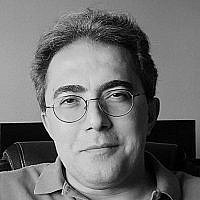This is definitely not my dad’s antiwar protest

As the son of Jerry Rubin, a renowned antiwar activist, I feel compelled to address a misconception that has emerged in recent days. While my father advocated for peace and social justice, there is a dangerous trend in which certain factions, under the guise of antiwar sentiment, openly support violent organizations such as Hamas, Islamic Jihad, and Hezbollah. These groups do not promote peace but rather espouse ideologies that promote violence and hostility towards Jews.
There is a vast divide between genuine antiwar activism, which seeks to prevent conflict and promote dialogue, and the insidious agenda of those who use the rhetoric of peace to justify their support for organizations with violent aims.
During the Vietnam War era, college students protested against the military draft and the war, not in support of the Viet Cong or calls for the eradication of South Vietnam. The iconic peace sign symbolized their generation’s stance against the conflict that claimed so many lives, including 58,000 Americans.

The intersection with the civil rights movement was poignant, as black Americans faced higher draft rates and accounted for a disproportionate share of casualties during a period of widespread discrimination.
However, today’s purported intersectionality between Palestine/Hamas and LGBTQ/feminist (or environmental) rights is not only fictitious but also abhorrent. Hamas has perpetrated significant sexual violence against Israeli women, prohibits Palestinian women from property ownership, and executes individuals based on their sexual orientation. Despite efforts to portray the Palestinian Authority (PA) of the West Bank as a moderate entity, its track record on liberal values such as LGBTQ rights and women’s rights is deeply troubling. The PA’s failure to uphold basic human rights undermines any claims to progressiveness.
During the turbulent 1960s, protesters advocating for civil rights and against the Vietnam War often took to the streets, their faces uncovered, to demand change. It was the Ku Klux Klan of that era that used anonymity to spread fear and hatred. The Klan wore hoods to conceal their identities while perpetrating acts of violence and intimidation. In stark contrast, the protesters of the 60s stood proudly, their faces shown, as they fought for equality and justice. Today, a concerning parallel emerges as the protesters advocating for the destruction of Israel wear masks akin to the KKK, obscuring their identities while promoting a murderous ideology bent on violence and eradication. This resemblance underscores not only the stark contrast in ideologies but also the concerning tactics employed by those who seek to spread hatred and violence.
Protests at colleges like Columbia University are downright disturbing, with demonstrators advocating for the murder of Israeli soldiers defending their homeland. Chants like “Al Qassam you make us proud, kill another soldier now” reflect this disturbing trend of antisemitism. Other chants included “We say justice you say how, burn Tel Aviv to the ground”, “It’s right to rebel, Hamas give them hell”, and “Red, black, green and white, we support Hamas’ fight!”
It is crucial to recognize that these protesters are far from embodying antiwar sentiments; rather, they espouse a fervent enthusiasm for war. Their chants and actions reveal a desire not for an end to fighting, but for an increase in fighting, leading to the complete eradication of the state of Israel. These individuals do not advocate for a cessation of hostilities but instead seek to perpetuate a cycle of violence that undermines any prospects for genuine peace and coexistence in the region.
If today’s student protestors advocated for a two-state solution, an end to Judea and Samaria (West Bank) settlement construction, or a ceasefire with the release of hostages, their demands might seem reasonable. Yet, the current flurry of protests on campuses detract from constructive discourse, often advocating for the destruction of Israel outright with chants including “We don’t want no two-state, we want all of it” and assertions such as “Palestine is Arab.” Despite this clear evidence, certain congresspeople including Cori Bush, Rashida Tlaib and Ilhan Omar have mislabeled these protestors as “antiwar.”
There are alarming parallels between past and present manifestations of bigotry. In Charlottesville, the chilling chants of “the Jews will not replace us” sent shockwaves through the nation. Similarly, at Columbia (and other campuses), protesters rallied saying: “We don’t want no Zionists here,” a thinly veiled euphemism for antisemitic sentiment. Over 95% of Jews identify with Zionism, which seeks to uphold the right to self-determination for the Jewish people and the existence of the State of Israel, where roughly half of the world’s Jews reside. Thus, such chants not only perpetuate discriminatory attitudes but also serve to marginalize and alienate Jewish individuals, undermining the principles of inclusivity and tolerance that should underpin any genuine pursuit of social justice.
Advocating for the destruction of Israel and opposing Zionism is inherently a violent proposition. Zionism embodies the fundamental right to national self-determination for the Jewish people and underpins the existence of the State of Israel. Any call for its annihilation not only dismisses the rights and aspirations of millions of Israelis, including the two million Arab Israeli citizens, but also poses a grave threat to the safety and stability of the entire region.
This rhetoric of destruction serves to inflame conflict, breed hostility, and perpetuate a dangerous cycle of violence, ultimately undermining any prospects for genuine peace and coexistence. By advocating for the eradication of Israel and rejecting Zionism, proponents are advocating for a bloody war. They are obstructing sincere efforts towards reconciliation and the peaceful resolution of the Israeli-Palestinian conflict.
The existence and development of the State of Israel is indeed a just endeavor rooted in the principle of self-determination for the Jewish people. Israel has consistently demonstrated its commitment to peace through diplomatic efforts and negotiations with its neighbors. In addition to being a refuge for Jews fleeing persecution, Israel remains dedicated to protecting the rights of all its citizens, regardless of their ethnicity or religion.
Moreover, Israel has the inherent duty to defend itself against any threats to its security and the well-being of its citizens. In the face of constant security challenges and attacks, it is imperative for Israel to take decisive actions to safeguard its population and ensure its continued existence as a thriving democratic nation.
Authentic peace activists recognize the importance of dialogue, negotiation, and mutual respect in resolving conflicts. They understand that lasting peace can only be achieved through compromise, understanding, and acknowledgment of the fundamental rights and aspirations of all people, while also rejecting terrorism as a means to achieving political goals.
The Democratic Convention of 2024 being held in Chicago evokes memories of the 1968 Democratic National Convention, albeit with a stark contrast in focus. In 1968, the convention was a focal point for antiwar sentiments, with protesters advocating for peace amidst the Vietnam War. However, in the present day, the convention serves as a backdrop to a different narrative. The “anti-Zionist” protests on college campuses promote violence, undermining the principles of genuine antiwar activism championed by figures like my father, Jerry Rubin.



